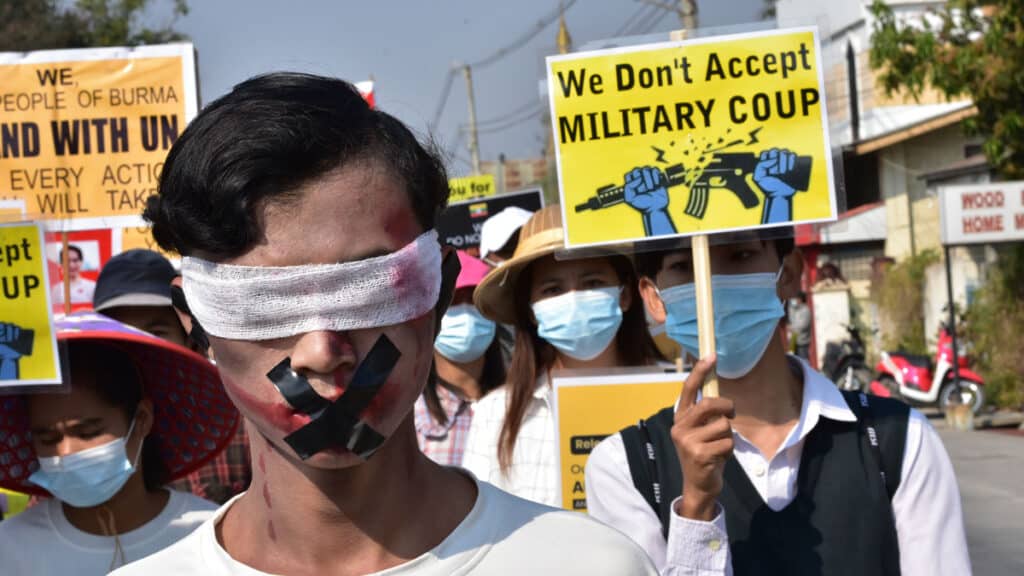Myanmar Cannot Wait: Only Coordinated Global Pushback Will Stop Escalating Violence and Repression
Dhevy Sivaprakasam, Alexia Skok, Wai Phyo Mint, Golda Benjamin / Aug 17, 2023Dhevy Sivaprakasam is Senior Policy Counsel, Golda Benjamin is Asia-Pacific Campaigner, Wai Phyo Myint is Asia Pacific Policy Analyst, and Alexia Skok is Communications and Media Manager at Access Now.

This Sunday, August 20, it will be two years since curfew-style internet shutdowns across Myanmar’s Hpakant township disconnected the world from the ongoing devastation inflicted by the military. Heinous reports of targeted airstrikes, widespread arson, ill-treatment, and killings continue to trickle out from the township — and many others across the country — hampered by connectivity blockages. Over 50 million people in Myanmar are now halfway through a third harrowing year of repression. Yet, as the crisis slides out of news cycles, there is no decisive pushback from the international community on the horizon.
Control of information allows for control of people. The military’s coup is also digital — and the online takeover is very nearly complete. Governments cannot continue to simply sit idle as the Myanmar military terrorizes a nation with impunity through the abuse of surveillance tools and internet shutdowns to perpetrate atrocities. They must commit to and coordinate effective measures to ban the sale of surveillance technologies and assistance to the military, and provide alternative means for internet access to combat the devastating impacts of shutdowns and targeted blockings.
Abuse of surveillance technologies
In a desperate bid to seek international legitimacy, the junta seems determined to impose elections on the people of Myanmar “under any circumstances.” Yet, it recently extended the state of emergency for the fourth time, indefinitely delaying planned elections and granting itself a time extension to ramp up surveillance infrastructure and fortify an invisible digital prison within which people are monitored, marked, and ultimately forced into subservient voting.
The military already has near-complete domination of Myanmar’s online spaces. It has activated intercept spyware across a telecommunications network it fully controls, and revised regulatory frameworks to facilitate unfettered collection of data relating to people’s locations, communications, relationships, and other essential information such as banking and property ownership. It has expanded biometric systems, including pilot projects discriminatorily tracking minority communities, and is reportedly forcing small business owners to install closed-circuit televisions (CCTVs) while demanding full-body images to track household numbers. All of this information is being collated into a national database for military oversight, while it plows on with efforts to conduct a population census by 2024 for the looming elections. This arsenal of technological tools is propping open digital windows into the lives of millions, laying bare snippets of private information that the junta is meticulously puzzling together, creating invasive pictures of individuals’ personal lifestyles, experiences, and behaviors.
But there are global actors at play assisting the junta. The digital tools the military is relying on are not domestic. They come from foreign suppliers, and international actors facilitate their procurement and deployment. In January, Yanghee Lee, member of the Special Advisory Council for Myanmar, highlighted how the Myanmar military has “evaded sanctions for decades” with the “assistance of foreign companies” — including reported support from China’s Aerospace Science and Technology Corporation in providing surveillance drones. Then in May, Tom Andrews, the UN Special Rapporteur for Myanmar, further exposed shadowy global networks sending weapons shipments to Myanmar — including the consignment of surveillance technologies by India’s Bharat Electronics and Russia’s United Aircraft Corporation. Reports have also revealed military procurement of biometric technologies from China’s Zhejiang Dahua Technology, Huawei Technologies Co. Ltd and Hikvision and intercept spyware from Israel’s Cognyte Software Ltd.
Surveillance technology providers have long operated in an accountability blackhole, where companies profit from engaging the junta. As Andrews emphasized, for governments to “stop, or at least slow” trade prolonging “Myanmar’s nightmare,” they must coordinate sanctions and target “entire networks of proliferators, not just individual companies.” This includes imposing bans on the sale or transfer of surveillance or biometric technologies, equipment, intelligence, or related assistance to the Myanmar military — bans that must be coordinated to ensure actual impact.
Internet shutdowns
The military persists in weaponizing internet and connectivity shutdowns to violate human rights, including serious infringements which may amount to war crimes and crimes against humanity. The UN High Commissioner of Human Rights, Volker Türk, has underscored that shutdowns obstruct humanitarian assistance — restricting communications, cutting off delivery routes, undermining reporting and assessment, halting access to funds, and forcing people to undertake treacherous journeys to seek access. The direness of this situation is exacerbated given the reports of torture, ill-treatment, persecution and arson across affected areas.
Since the coup, internet shutdowns have provided a cloak of impunity for military assaults against communities. For residents in Hpakant township, life under a two-year long blackout means suffering in silence through indiscriminate attacks via airstrikes, arson, and murder. Even in places where the junta has lost control, it is reportedly using jammers to interfere with wireless signals of alternative communications that the targeted communities are using.
To blunt these devastating impacts of shutdowns, global leaders must cooperate to provide effective aid to the people of Myanmar. It is essential that this includes support for the ongoing efforts of local groups to use alternative communication methods, and the provision of devices, technology, and related assistance to ensure stable and reliable access and connectivity. As Türk implored governments at the Human Rights Council last month, Myanmar’s “deadly freefall” requires urgent action — including through “flexible funding arrangements” and reimagining “creative ways and means” to deliver aid. In short: by any means possible, help people in Myanmar.
Combating the digital dictatorship
Since 2021, the military has consolidated a digital dictatorship, forcing the people of Myanmar into an online abyss defined by two dystopias — an information vacuum or a panopticon-like prison. On the one hand, people suffer through internet shutdowns and connectivity blackouts, while struggling to afford the exorbitant costs of internet and mobile usage. On the other, people desperately seeking ways to communicate are offered only one path out, paved in an invisible fabric of digital tools designed to track and target them. To truly support the people of Myanmar, governments across the globe must blunt both ends of the military’s digital aggression — by investing in genuine and effective international action and coordination. Two and a half years is too long. The international community must act now.
Authors



